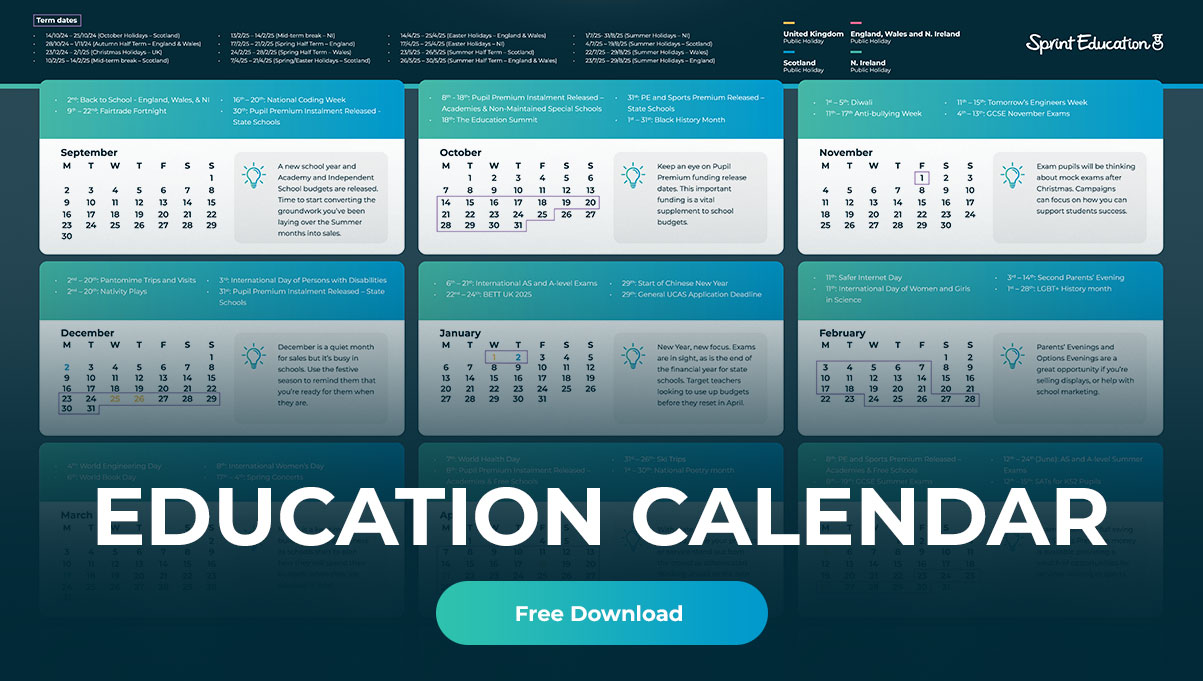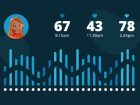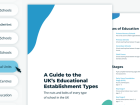A Who’s Who Guide to UK School Staff (Part 3)
A Who’s Who Guide to UK School Staff (Part 3)
Target your schools marketing with our breakdown of the roles and responsibilities of every school decision-maker and influencer in the UK.
Target your schools marketing with our breakdown of the roles and responsibilities of every school decision-maker and influencer in the UK.
Health, Safety, and Wellbeing
Anti-Bullying Coordinator - Decision-Maker
The Anti-Bullying Coordinator develops the school’s approach to bullying, implementing steps to successfully monitor bullying and quickly set effective interventions. They’ll be responsible for training all staff on these policies. They’ll also coordinate and promote pupil/parent involvement in strategies to tackle bullying.
Designated Safeguarding Person - Decision-Maker
The Designated Safeguarding Person, usually a role performed by a member of the SLT, takes the lead responsibility for child protection. In charge of developing and enforcing such policies, they’ll train staff on recognising and raising safeguarding concerns, handle referrals to social care, monitor pupils with child protection plans, and maintain accurate and secure records.
First Aider - Influencer
A voluntary role, the school’s First Aiders are responsible for dealing with all day-to-day medical issues. This covers minor ailments, including administering plasters and regular medication, to more serious situations such as accompanying pupils to hospital if necessary. They’ll be responsible for all paperwork and external reporting, and liaising with parents and school nurses.
Healthy Schools Coordinator - Decision-Maker
The Healthy Schools Coordinator is responsible for ensuring the school maintains their engagement with the relevant healthy school programmes set out by the government. They’ll work closely with the PSHE lead to ensure the curriculum provides adequate, accurate coverage of the healthy schools policies, and promote the school as a health-conscious environment by organising events with pupil/parent engagement.
HR Manager - Decision-Maker
The school’s HR Manager is responsible for providing a consistent approach to improving the quality of learning and development. This could cover assisting with staff recruitment and development, reviewing the school’s performance, keeping up-to-date with inspection board regulations, and monitoring compliance with policies and procedures.
Wellbeing Coordinator - Decision-Maker
The Wellbeing Coordinator is responsible for promoting positive mental health and wellbeing across all staff and pupils. This includes developing and conducting policies and risk assessments, running regular wellbeing initiatives, working with teaching staff to address pupils who’d benefit from a modified curriculum, and building community connections to provide additional support.
Subject Staff
Subject Heads - Decision-Maker
All Subject Heads are expected to work in partnership with the SLT, Governors, and all subject staff to ensure continuous improvement of their subject. They’ll be responsible for planning the curriculum, managing department staff, procuring resources, assessing progress, working with the SEND department for pupils who need extra support, and supporting the SLT with policies relating to their subject.
Subject Teacher - Influencer
Supported by their Subject Head, Subject Teachers support and develop pupils’ skills and outcomes through excellent teaching delivery. Requiring an excellent understanding of the National Curriculum, they’ll plan their classes’ lessons, assess outcomes, and set targets in-line with department goals.
Arts Staff
Including: Art, Dance, Drama, Expressive Arts, Music, and Performing Arts, Fine Art, Digital Arts & Design, Design, Fine Art, and Photography.
D&T Staff
Including: D&T, Carpentry/Woodwork, Architecture, and Engineering.
In almost all Primary and Secondary schools, the D&T department will include solely the D&T teachers, who may touch upon subjects listed above in their standard D&T lessons. Moving into FE and HE providers, the D&T department will break into more specific subjects, including those listed above. As with other subjects, staff are responsible for day-to-day classroom management, with the subject heads having more departmental and school-wide responsibility.
Business and IT Staff
Including: Business Studies, Economics, Government & Politics, Law, Computing, ICT, Computer Science, Accounting, and Marketing.
It’s not uncommon for Business and IT staff to teach several of the subjects listed above due to school budgets and the lack of specialist teachers, meaning thorough resources and support are necessary for successful curriculum delivery. Computing and IT staff may also hold the role of Network Mangers or IT technicians for the same reasons above. They may also assist with STEM and coding initiatives, and supporting more female pupils into STEM roles.
English and Media Staff
Including: English, Media Studies, Creative Writing, Film Studies, and Animation.
On top of their regular classroom duties, English Teachers often support the school’s wider literacy targets and SEND goals, ensuring every pupil has the literacy skills to aid their personal development. Staff, particularly Media staff, may support other departments and the school library in procuring and organising learning resources, and supporting online learning initiatives.
MFL Staff
Including: Arabic, French, German, Latin, Mandarin, MFL, Spanish, and Welsh.
Once again, it’s not uncommon for MFL staff to teach more than one language; covered under the general MFL job role, or by holding multiple job roles in specified languages. MFL staff are often in charge of organising and supervising international school trips, and may assist with supporting EAL (English as an Additional Language) pupils.
Science, Maths, and Medical Staff
Including: Biology, Chemistry, Maths, Physics, Science, Microbiology, Nursing and Midwifery, Health & Medical Sciences, and Zoology.
The Science and Math staff help to lead the school’s STEM initiatives, working with other technology staff to setup workshops, events, and extra-curricular challenges for pupils to get involved in. Once again, lots of Science Teachers will teach all three sciences, and it’s not uncommon for Maths Teachers to also teach Physics.
Social Science Staff
Including: Citizenship, Classics, Geography, Health & Social Care, History, Humanities, Psychology, Social Science, Sociology, Philosophy, Health, Social, & Occupational Care, Criminology.
As well as standard lesson delivery, Social Science Staff help pupils take an active stand in the world around them and the issues that affect them. They may lead charity events, support climate change protests, set up local partnerships within the community, and back other pupil-led initiatives to support their role in society.
RE and PSHE
Including: Religious Studies and PSHE
Although all school staff play a role in supporting emotional and personal development, RE and PSHE staff have a larger role to play in pupil welfare. Working closely with SEND departments and Wellbeing staff, subject staff will ensure all teaching is supportive of individual pupils’ situations, while meeting whole-school policies.
Sports Staff
The sports staff are responsible for the school’s PE offering. In collaboration with the Healthy Schools Coordinator and Wellbeing Coordinator, they’ll typically lead and manage a wide variety of extracurricular physical exercise activities to account for limited timetabled PE. This could also include less-intense wellbeing activities such as yoga, or supporting Dance staff to offer Dance clubs.
Sports Science
A subject more commonly found in Higher Education providers, Sports Science teach the real-life challenges in sport, health, and exercise. Staff will ensure the implementation of quality teaching by applying scientific knowledge of physiology, biomechanics, and psychology. Sports Science staff may also be responsible for the health and safety of those involved in school sports clubs.
Outdoor Studies
Outdoor Studies staff provide a foundation in the philosophical, theoretical, and practical aspects of outdoor, environmental, and experiential leadership, education, and practice. This can include outdoor sports (for which staff may collaborate with members of the Sports and Sports Science departments), adventure tourism, and sustainability.
Vocational Studies Staff
Including: Leisure & Tourism, Vocational Studies, Beauty & Hairdressing, and Projects & Events Management.
Vocational staff support pupils with an aptitude for vocational and technical subjects. They may work closely with the SEND department to ensure all pupils make good progress within their chosen subject. They’ll often also need to establish partnerships with outside agencies to expand the hands-on learning available to pupils. Organised by the Heads of these subjects, some larger schools may open their services (such as travel agents or hairdressing) up to the community, letting their students gain essential hands-on work experience.
What Next?
Ready to learn just how many accurate, continually updated teacher emails you can reach with your next campaign? Get in touch on info@sprint-education.co.uk or 01684 297373 for a quick count and a walkthrough of Campus. We’ll be ready and waiting!
Tags
Database of Schools
Database of Teachers
Education Data
Education Database
Emailing Teachers
Schools Database
Schools Email Database
Teacher Database
UK School Database
Similar Articles


Marketing EdTech and Software to Schools and Teachers
Learn 10 game-changing insights especially for edtech and software businesses to enhance your education marketing campaigns when emailing schools.


Introducing... The UK Teacher and School Insights Module
Access essential buying data from teachers and school staff to power up your marketing campaigns - directly from your education CRM!


Expert marketing to schools support and solutions
Expert marketing to schools solutions
Email Head Teachers, Teachers, and Staff Inboxes
Email teachers and staff inboxes
Sell More to UK and Global Schools and Colleges
Sell more to schools and colleges

































